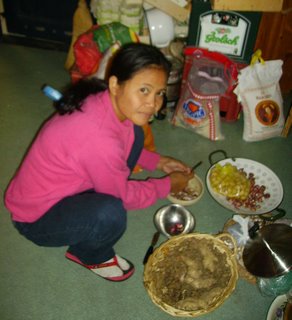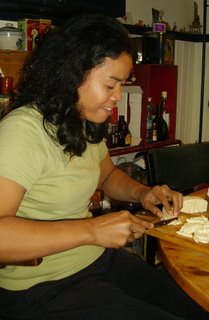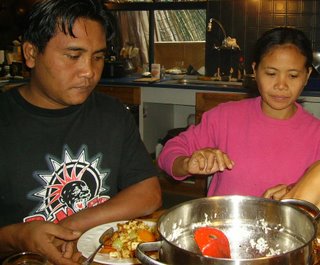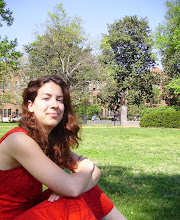 Cok, Wayan en Komang all are from Bali and are in the Netherlands to help out at the Pasar Malam Besar in the Hague, a big "Eurasian culture" festival. For Cok and Komang, it is already the second time they visit here, for Wayan (Komang's sister), it's a first. At left, she has created a miniature Bali at my parents' home, crouching the Indonesian way to peel the bawang merah (small red onions).
Cok, Wayan en Komang all are from Bali and are in the Netherlands to help out at the Pasar Malam Besar in the Hague, a big "Eurasian culture" festival. For Cok and Komang, it is already the second time they visit here, for Wayan (Komang's sister), it's a first. At left, she has created a miniature Bali at my parents' home, crouching the Indonesian way to peel the bawang merah (small red onions).The white garlic, ginger and assorted plastic bags with chicken broth and noodles also are imported directly from Bali. I think the mie noodles have a strange blue tinge, and am happy that tonight we'll just have rice, with pork, tofu, tempeh and assorted vegetables. To assure that everyone will enjoy the meal, the spicy sauce is not added to the meat, but put in a separate bowl.

At right, you can see the basic ingredients of a Balinese sauce; first terasi (fermented shrimp paste), then garlic and the red onions. They so similar they are called white and red garlic (bawang putih and bawang merah). The knife is also typically Indonesian.
 On Bali they are also Hindu, so beef is a no-no. Pork, chicken, fish, shrimp and the vegetarian tofu and tempeh are the main protein sources. Though I usually don't find tofu and tempeh that appetizing, Cok manages to make it crisp and tasty. At left you can see her chopping the tempeh.
On Bali they are also Hindu, so beef is a no-no. Pork, chicken, fish, shrimp and the vegetarian tofu and tempeh are the main protein sources. Though I usually don't find tofu and tempeh that appetizing, Cok manages to make it crisp and tasty. At left you can see her chopping the tempeh.When dinner is served, I notice that especially Wayan is handling her knife and fork with caution. It turns out that she is only using them because I am there...with my parents, she feels more at ease and just eats with her hands, like she would at home.
An interesing thing about Bali is how they name their children. Wayan is the first-born, Made the second born, Komang the third and Ketut the fourth. After that the cycle starts again! In this case, Komang is responsible for the family because he is the oldest son. Wayan is his adik, his little sister, the fifth-born. Because these names are so common, things can get a bit confusing with 200 Ketuts in one village. That is why nicknames are popular.

After dinner we watch "Garuda TV Yours!", the Indonesian channel here in Holland. Most of the shows seem to be made to attract tourists, but the show we watch is pretty interesting. It is about a family that had twins. According to Balinese adat, local laws, the birth of female-male twins must be treated differently. The so-called buncing twins are supposed to live in an isolated area for the first months of their lives. This show was about a young couple who lived by the adat laws, until the boy twin became ill. Disobeying the laws, they left the isolated hut
 they lived in to bring their son to the hospital. According to the local priests the couple now could not be sure of a pleasant after-life. Somehow, to be absolved, they were expected to pay the amazing sum of 400 euros to the priest. For Bali, this is an incredible amount of money.
they lived in to bring their son to the hospital. According to the local priests the couple now could not be sure of a pleasant after-life. Somehow, to be absolved, they were expected to pay the amazing sum of 400 euros to the priest. For Bali, this is an incredible amount of money.So, with Komang and Cok we discuss what these young parents were supposed to do. They are definitely sympathetic towards the father's dilemma. It is difficult to obey laws if it means risking your son's life!

No comments:
Post a Comment